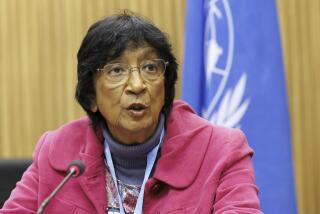Vatican Advised on Abuse Policies
- Share via
ROME — A panel of scientists and psychiatrists, in a long-awaited report released Monday, offered recommendations for preventing the sexual abuse of children by Roman Catholic priests but emphatically rejected the U.S. church’s “zero-tolerance” policy of defrocking offenders.
The policy can discourage abusive clerics from seeking help or recklessly unleash pedophiles into society once they are ousted from the church, the report said.
Commissioned by the Vatican’s Pontifical Academy for Life, the 220-page study came out of a symposium in April and was presented to journalists at the Vatican on Monday. The unusually frank report represents the most comprehensive effort by the church to seek a clinical understanding of pedophilia, as well as ways to screen for and treat it.
“It is very important for the church to understand the state of the art of science when dealing with this matter” of sexual abuse, the report’s editor, Dr. Manfred Luetz, a German psychiatrist, said in an interview.
A Vatican spokesman said the report would serve as a “scientific base” and “point of reference” for future guidelines.
The Catholic Church worldwide, and especially in the United States, has been rocked by scandal for the last several years involving hundreds of cases of sexual abuse of minors and a widely held perception that senior clerics turned a blind eye to the problem.
On Friday, the U.S. Conference of Catholic Bishops will issue a report in Washington detailing the extent of the sexual-abuse problem in the United States over the last 50 years.
The study by the John Jay College of Criminal Justice in New York will include the number of molesting priests -- expected to exceed 4,000 -- their victims and the amount of money paid in settlements.
The survey is part of a series of reforms, including a zero-tolerance policy, launched by U.S. bishops nearly two years ago in response to the church’s national sex scandal that erupted in Boston in January 2002. The same year, Pope John Paul II told American church leaders that “there is no place in the priesthood and religious life for those who would harm the young.” The Vatican approved the U.S. reforms in December 2002.
Bishop Wilton D. Gregory, president of the bishops conference, on Friday upheld the policy of removing priests after a single incident of abuse as “wise and pastorally sound.”
“What we do with those individuals is still a question that needs further review,” he added.
The U.S. policy on sexual abuse of minors is set to expire in June, and U.S. bishops will be working out a plan to review it, Gregory told religion writers.
“Zero tolerance” isn’t the answer and could ultimately prove counterproductive, according to the eight international experts whose views went into the new report. All except Luetz are non-Catholic.
“It may in fact be more dangerous,” Luetz said. The offender “is out of the church but still in society.” Denying the pedophile access to children but maintaining ecclesiastical supervision of his activities, once he’s served a prison sentence, is a preferred way to prevent further abuse, the report suggested. Sending him back into society would be an “abdication of responsibility” by the church, one of the experts wrote.
Criticism of the zero-tolerance policy was the only area of complete consensus, Luetz said. Panel members disagreed over the extent to which homosexuality or celibacy might be seen as “risk factors” for potential abuse and whether candidates for the priesthood could be screened.
The volume will be published next month.
Times staff writer William Lobdell contributed from Los Angeles.
More to Read
Sign up for Essential California
The most important California stories and recommendations in your inbox every morning.
You may occasionally receive promotional content from the Los Angeles Times.











